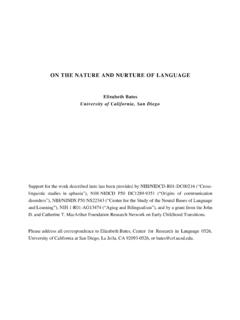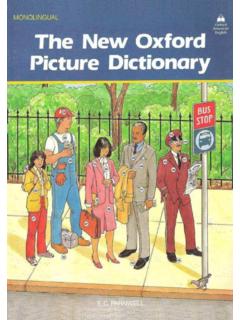Transcription of THE NATURE OF LEGAL LANGUAGE [This material …
1 THE NATURE OF LEGAL LANGUAGE [ this material may be used for educational or academic purposes if cited or referred to as: Peter Tiersma, The NATURE of LEGAL LANGUAGE , ] One of the great paradoxes about the LEGAL profession is that lawyers are, on the one hand, among the most eloquent users of the English LANGUAGE while, on the other, they are perhaps its most notorious abusers. Why is it that lawyers, who may excel in communicating with a jury, seem incapable of writing an ordinary, comprehensible English sentence in a contract, deed, or will? And what can we do about it? Consider, first, the eloquence of the LEGAL profession. Daniel Webster was famed for his oratory skills. Called upon to assist the prosecution in a murder case, Webster addressed any hesitations the jurors might have harbored about their power to punish the guilty.
2 In doing so, he provided a memorable defense of the theory of deterrence: The criminal law is not founded in a principle of vengeance. It does not punish that it may inflict suffering. The humanity of the law feels and regrets every pain that it causes, every hour of restraint it imposes, and more deeply still, every life it forfeits. But it uses evil, as the means of preventing greater evil. It seeks to deter from crime, by the example of punishment. this is its true, and only true main object. It restrains the liberty of the few offenders, that the many who do not offend, may enjoy their own liberty. It forfeits the life of the murderer, that other murders may not be committed. A very different picture of the deterrent effect of punishment was painted by Clarence Darrow, another great LEGAL orator.
3 Darrow sought to persuade a judge to spare the lives of his two young clients, who had pled guilty to a sensational murder: What about this matter of crime and punishment, anyhow? .. Mr. Savage tells this court that if these boys are hanged, there will be no more murder. Mr. Savage is an optimist. He says that if the defendants are hanged there will be no more boys like these. I could give him a sketch of punishment, punishment beginning with the brute which killed something because something hurt it; the punishment of the savage; if a person is injured in the tribe, they must injure someone in the other tribe; it makes no difference who it is, but somebody. If one is killed his friends or family must kill in return. You can trace it all down through the history of man.
4 You can trace the burnings, the boilings, the drawings and quarterings, the hanging of people in England at the crossroads, carving them up and hanging them as examples for all to see. At the end of his long argument, Darrow had the judge in tears. Despite angry mobs lusting after a hanging, the judge sentenced the young men to life in prison. Yet as mentioned, lawyers are also among the worst abusers of LANGUAGE . Contemplate the convoluted and redundant NATURE of the typical modern will, a document so important that it is effective only if signed in the presence of witnesses. The first problem is the title: Last Will and Testament. There is no difference between a will and a testament, so either term would suffice. And to label this the last will is absolutely ludicrous. Virtually every will traditionally bears this title, regardless of whether it is the first, the last, or somewhere in the middle.
5 The will produced by a modern-day Webster or Darrow would probably begin with the words: I, HELEN HOOVER, of the Town of Goleta, County of Santa Barbara and State of California, do hereby make, publish and declare this as and for my Last Will and Testament, hereby revoking all wills and codicils thereto heretofore by me made. More simply stated: I declare that this is my will and revoke any previous wills. The next provision is normally the following: I direct my Executor to pay my funeral expenses and all my just debts, except those secured by mortgage or otherwise, out of my estate. this clause is almost always completely useless. Virtually every jurisdiction makes the estate legally liable for debts and funeral expenses, regardless of any directive in the will. After some specific gifts comes the critical part of almost any will: the residuary clause.
6 Once more, this example was taken virtually verbatim from an actual--and fairly typical--modern will: I give, devise and bequeath all of rest, residue and remainder of my property which I may own at the time of my death, real, personal and mixed, of whatsoever kind and NATURE and wheresoever situate, including all property which I may acquire or to which I may become entitled after the execution of this will, in equal shares, absolutely and forever, to ARCHIE HOOVER, LUCY HOOVER, his wife, and ARCHIBALD HOOVER, per capita, to any of them living ninety (90) days after my death. Again, the reader is inundated by a flood of convoluted and largely empty prose. All that need be said is I give the rest of my estate in equal shares to Archie Hoover, Lucy Hoover, and Archibald Hoover, assuming they survive me by at least 90 days.
7 Other categories of LEGAL documents fare no better. Here is part of what is called a deed of trust: Borrower covenants that Borrower is lawfully seised of the estate hereby conveyed and has the right to grant and convey the Property and that the Property is unencumbered, except of the encumbrances of record. Borrower warrants and will defend generally the title to the Property against all claims and demands, subject to any encumbrances of record. this is not a dusty old parchment from an obscure English archive. I signed this document seven or eight years ago when I bought my house. A mortgage or deed of trust is one of the most important obligations that a person can undertake. Yet how many homeowners have any idea what it means to be lawfully seised of anything, or what encumbrances of record are?
8 How many would realize that this paragraph could require them to pay large amounts of attorneys fees if there turn out to be problems with title to the property? Or consider the legalistic warning commonly contained on isopropyl alcohol, a substance some people might be tempted to drink: FOR EXTERNAL USE ONLY Will produce serious gastric disturbances if taken internally. Does this mean that you should only drink it outdoors? Clearly that is not the intent. But if the message is do not drink, why not just say so? LEGAL LANGUAGE has become so notorious that it has entered the realm of popular humor. To Will Rogers once wrote that "the minute you read something and you can't understand it you can almost be sure it was drawn up by a lawyer. Then if you give it to another lawyer to read and he don't know just what it means, why then you can be sure it was drawn up by a lawyer.
9 " The Marx Brothers lampooned the LANGUAGE of the law in A Night at the Opera; Groucho and Chico successively lopped off portions of a contract relating to the party of the first part, party of the second part, party of the third part, and so forth ad nauseam. Current lawyer jokes make a similar point: After months of bickering, a divorce lawyer completes negotiations with the other side and calls his client with the good news. "So what did you work out?" George asks the lawyer. "Well, what it boils down to is that the party of the first part, to wit, George Smith, shall convey to the party of the second part and to her heirs and assigns forever fee simple to the matrimonial estate, including all property real and personal and all chattels appurtenant thereto." "I don't get any of that," George muttered.
10 "That's right." Even highly educated judges may be dumbfounded by LEGAL prose. During oral argument regarding an insurance policy in 1969, Chief Justice Weintraub of the New Jersey Supreme Court confessed: "I don't know what it means. I am stumped." Justice Haneman admitted, "I can't understand half of my insurance policies," and Justice Francis suggested that the policies are kept "deliberately obscure." Why can't lawyers write more clearly, concisely, and comprehensibly? We know they can communicate well enough when they want to. So why must so many important LEGAL documents--documents that govern our rights and obligations as citizens, that allow a bank to repossess our house, or that determine who is responsible for damage to a rental car--be in virtually unintelligible legalese?










